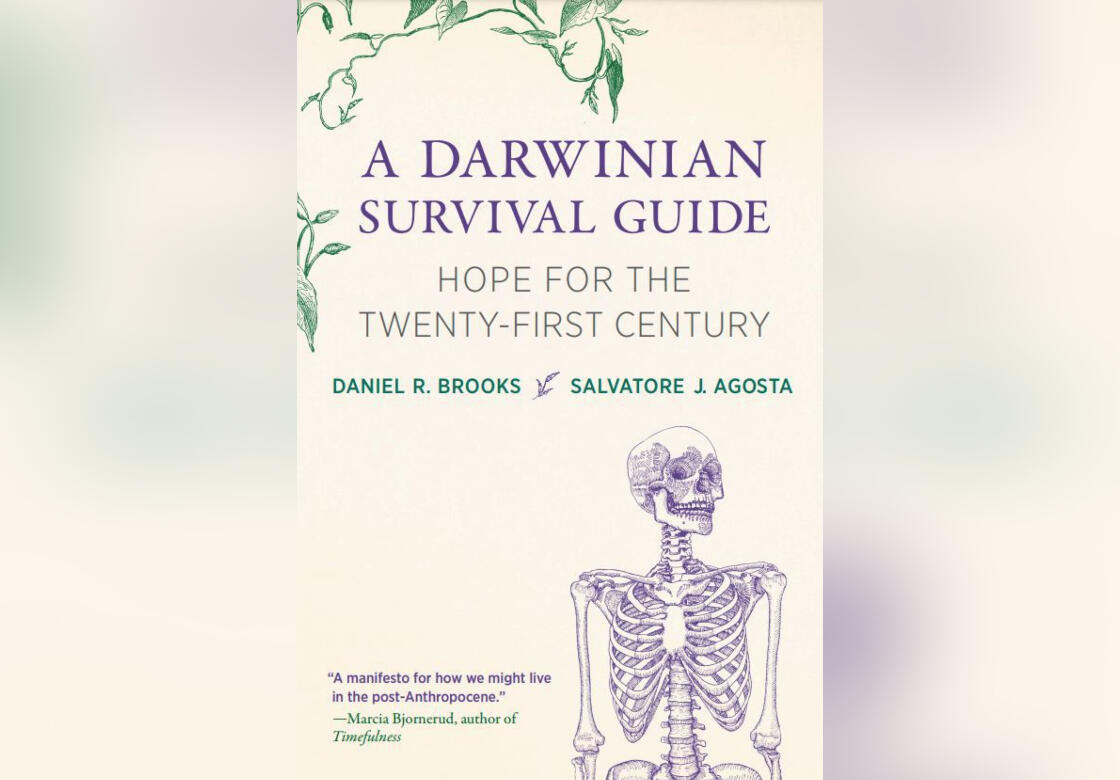
Feb. 14, 2024
VCU co-author of ‘A Darwinian Survival Guide’ reframes climate change – and the paths forward – through the lens of evolution
Share this story
“A Darwinian Survival Guide: Hope for the Twenty-First Century,” co-written by Virginia Commonwealth University professor Salvatore Agosta, Ph.D., suggests that humanity brought about the climate crisis by departing from its evolutionary trajectory 15,000 years ago, and it argues that evolutionary principles could save humanity from the worst outcomes.
Agosta, an associate professor in the Center for Environmental Studies, part of VCU Life Sciences, wrote the book with Daniel R. Brooks, Ph.D., a professor emeritus at the University of Toronto. Agosta and Brooks previously co-wrote “The Major Metaphors of Evolution: Darwinism Then and Now.”
Agosta recently discussed their new book with VCU News.
What inspired you and Dr. Brooks to write “A Darwinian Survival Guide”?
We were inspired by the fact that we are 15,000 years or so into the Anthropocene [the current geological age of human activity], and business as usual is not working. The world is becoming more urbanized with increasing population size, density and connectivity, chronic and largely unresolved conflict, bounded by global climate change. These factors conspire to threaten humanity’s immediate survival, at least as a highly technological species. To meet these challenges, humans invented the idea of sustainability — if we do less of what we are doing or do it more efficiently or more equitably, environmental conditions will return to “normal.”

We believe something is fundamentally missing from this view. It leads to the attitude that business as usual — including such mantras as “growth is good,” “bigger is better,” “technology will save us” and “we are not abandoning a place even when conditions change, even if we have to take things from our neighbors” — may continue if we just do it better. Business as usual is the problem. It leads to repeated episodes of crisis management, and in an increasingly technological world experiencing rapid environmental change, new challenges keep outpacing efforts to sustain the status quo.
To live sustainably, we must first understand what is survivable. For this we need to look to evolutionary biology, which is the science of survival. Evolution is the only mechanism that has allowed the biosphere to persist through 4.5 billion years of constant change, and so far it has an unbroken record of survival.
Arguments for sustainability and conservation are often based on the premise that the “normal” condition of the biosphere is stasis and that the goal is to maintain nature in its current state or return it to some previous state before humans. But the biosphere is a dynamic evolutionary system, with the built-in capacity to routinely tap into its evolutionary potential and respond to change by changing. It has done this countless times in the past across many spatial and temporal scales, with even mass extinctions leading to mass evolutionary renewal. It has already begun responding to the current changes in conditions across the globe, with species moving about in search of new places to live with more suitable conditions — sometimes forming interactions with new species — all in accordance with Darwinian principles of how the biosphere responds when it is perturbed.
Sustainability, if it is to be effective, needs to be couched in the context of Darwinian principles, which means coping with change by changing, not by resisting change. The Anthropocene is built on several notions that go against the evolutionary grain, that take away from our capacity to tap into our own evolutionary potential to cope with change by changing. Ultimately, this is not survivable and certainly not sustainable for much longer. To build a truly sustainable future for technological humanity, we must first shift the focus to understanding what is survivable.
How would you describe the book’s central message? What do you hope readers take away?
The biosphere, including humans and all its constituent members, is an evolvable system with an unbroken record of survival through even massive periods of environmental change. Evolutionary biology is the science of survival. Humanity got itself into the current climate change mess, but we can use evolutionary principles to get ourselves out of the predicament. The central message is that humanity brought about the climate crisis by departing from its evolutionary trajectory 15,000 years ago — becoming a sedentary species engaged in constant conflict with the environment and each other — but we can use evolutionary principles to save ourselves from the worst outcomes. For that, we need to connect our technological know-how with fundamental changes in our behavior in ways that better mimic the evolutionary process.
Our perspective is unique in treating the issue of humanity and global climate change as a problem of evolutionary biology, with solutions stemming from evolutionary principles. As a result, our book shows that there is a common foundation for the various problems and for the solutions to them. That foundation is Darwinian evolution, the only mechanism by which the biosphere has dealt with major environmental changes in the past and which has never failed.
Could you elaborate on how Darwinian evolutionary principles could help humanity avoid the worst outcomes of the climate crisis?
There is a vast amount of evolutionary potential stored in living species and the ecosystems they form. We call this the Evolutionary Commons. It’s the fundamental resource that life generates, maintains and deploys in response to changing conditions and that allows it to keep coping with change by changing. Life has the built-in capacity to both exploit and explore its surroundings, favoring exploitation (staying in place) when conditions are stable and exploration (moving away) when conditions change. Despite species exploiting their surroundings as much as possible, they and the collective biosphere persist for indefinite lengths of time by maintaining the ability to explore new options for survival when conditions change. Life inherently lives within its means, building potential when conditions are stable and spending this potential when conditions change. To ensure our own survival as a technological species with the benefits of modern civilization intact, we should learn to do the same.
Evolutionary principles can help humanity avoid the worst outcomes of climate change by teaching us lessons about persistence and by showing us what kind of behavioral changes we should make to increase our chances to not only survive but thrive sustainably. Evolution is not “survival of the fittest” but “survival of the fit” — any variant that survives and reproduces is an evolutionary success. To best meet the challenges of climate change, we need to accept what is coming and adopt a variety of solutions that are sufficient for survival, rather than hoping change will not happen or attempting to stop or reverse it. Since we are dealing with a complex evolutionary system, any efforts to control it will be largely futile and may lead to new unintended consequences.
Darwinism teaches us that while all species eventually go extinct, there is a 4.5-billion-year unbroken record of life surviving even massive perturbations and adapting to new conditions. We believe humanity can better meet the challenges of the Anthropocene if it becomes more comfortable with the notion that survival in nature is a matter of coping with change by changing rather than resisting change. And that is the essence of Darwinian evolution.
What do you hope this book adds to the conversation around climate change?
Most climate change specialists offer two negative alternatives: Stop all change now and hope that we will return to some mythical past that never existed — or annihilation. We offer two hopeful options based in Darwinian principles: Act now and extend the Anthropocene, or fail to act and rebuild.
Darwinism is a profoundly optimistic theory; while conflict is inevitable in living systems, so is conflict resolution favoring long-term survival over short-term gain. Darwinian principles illuminate a middle ground between unacceptable apocalypse or unattainable utopia, with two hopeful options – alter our behavior now at great expense based on Darwinian principles and extend current civilization, or fail to respond, fall and rebuild in accordance with those same principles. Evolution provides no guarantees of survival but a lot of potential. What is now in place may collapse first, but that does not mean utter destruction; as with the evolution of the biosphere, it can mean falling apart and rebuilding, analogous to the myth of the phoenix: Ce que vous avez perdu dans le feu, vous le retrouverez dans la cendre. (What you lose in the fire, you will find among the ashes.)
Subscribe to VCU News
Subscribe to VCU News at newsletter.vcu.edu and receive a selection of stories, videos, photos, news clips and event listings in your inbox.







